A Closer Look at the boAt Data Breach: Lessons Learned and Preventive Strategies
Protecting Your Business: Cyber Insurance Against Ransomware
A staggering 72.7% of organisations globally fell victim to a ransomware attack in 2023, according to Statista. These attacks are not only becoming more frequent but also more costly. SC Media reports that the average cost of recovering from a ransomware attack in 2023 hit $1.82 million, a figure that notably excludes the ransom payment itself. This alarming trend underscores the critical importance of cyber insurance in today’s business strategy.
Ransomware: A Growing Threat to Global Business
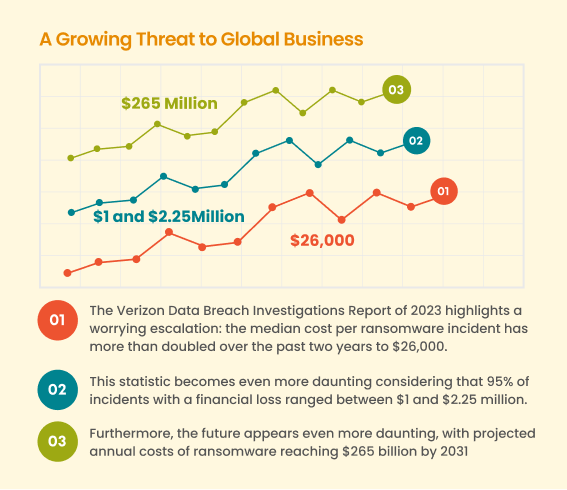
The Verizon Data Breach Investigations Report of 2023 highlights a worrying escalation: the median cost per ransomware incident has more than doubled over the past two years to $26,000.
This statistic becomes even more daunting considering that 95% of incidents with a financial loss ranged between $1 and $2.25 million.
Furthermore, the future appears even more daunting, with projected annual costs of ransomware reaching $265 billion by 2031. Beyond the staggering financial toll, businesses face downtime, operational disruptions, legal settlements, skyrocketing insurance costs, and the incalculable damage to trust from investors, clients, and employees.
The Indispensable Role of Cyber Insurance in Business

In the face of these threats, cyber insurance emerges as an indispensable shield. By offering a financial safety net, it allows businesses to recover from ransomware attacks without succumbing to financial ruin.
However, choosing the right cyber insurance policy demands careful consideration. It’s crucial to ensure that the coverage encompasses not just the direct costs of attacks but also accounts for the broader repercussions, including legal fees, notification costs, and even the ransom payments in some cases.
Crafting a Resilient Defense Against Ransomware
While cyber insurance is a critical component of a business’s defence strategy, it should be part of a broader, proactive approach to cybersecurity. Regular data backups, employee training on cyber threats, timely system updates, and the deployment of advanced security solutions form the bedrock of ransomware resilience.
These measures, coupled with a robust cyber insurance policy, can significantly mitigate the risk and impact of ransomware attacks.
Navigating the Future of Cyber Threats
As we look to the future, the evolution of cyber threats necessitates a dynamic response from businesses and insurers alike. The increasing specificity and sophistication of ransomware attacks will likely lead to more tailored cyber insurance solutions. These policies will need to adapt to the changing landscape, offering coverage that reflects the actual risks and potential damages businesses face.
Last words

The grim statistics on ransomware’s impact underline the necessity of cyber insurance in today’s digital world. As businesses navigate this challenging landscape, the right cyber insurance policy stands as a beacon of resilience, offering protection against the financial and reputational fallout of attacks. In an uncertain future, such insurance not only provides a crucial financial backstop but also signifies a commitment to safeguarding the very essence of a business in the digital age.
In this context, Mitigata sets itself apart by offering a comprehensive cyber solution that seamlessly integrates cyber insurance with cybersecurity measures. Our unique selling proposition lies in our holistic approach to protecting businesses, ensuring not just recovery from cyber threats but robust prevention against them, solidifying your business’s resilience in the digital domain.
Exploring the Contrasts: Cyber Insurance v/s Cybersecurity
Introduction: A Tale of Two Defences
In the heart of Silicon Valley, a startup once faced what could have been a crippling cyber-attack. Its servers were infiltrated, data was compromised, and the threat of sensitive information being leaked loomed large. However, this story took two divergent paths of resolution, thanks to the company’s foresight in investing in both cyber insurance and robust cybersecurity measures. This real-life event underscores the critical importance and distinct roles of cyber insurance and cybersecurity in the digital age. This article delves into their contrasts, synergies, and how they form the dual shields protecting modern businesses from the ever-evolving threats of the cyber world.
The Basics of Cybersecurity
What is Cybersecurity?
Cybersecurity refers to the practices, technologies, and processes designed to protect networks, devices, programs, and data from attack, damage, or unauthorised access. It is a continuously evolving field, adapting to counter new threats as they emerge.
The Evolution of Cybersecurity Threats
The landscape of cyber threats has grown exponentially, with hackers becoming more sophisticated in their methods. From malware and phishing to ransomware and advanced persistent threats (APTs), the array of tools at a cybercriminal’s disposal is vast and varied.
How Businesses Protect Themselves
Businesses employ a multitude of cybersecurity measures, including firewalls, anti-virus software, intrusion detection systems (IDS), and comprehensive employee training programs to mitigate the risk of cyberattacks.
Understanding Cyber Insurance
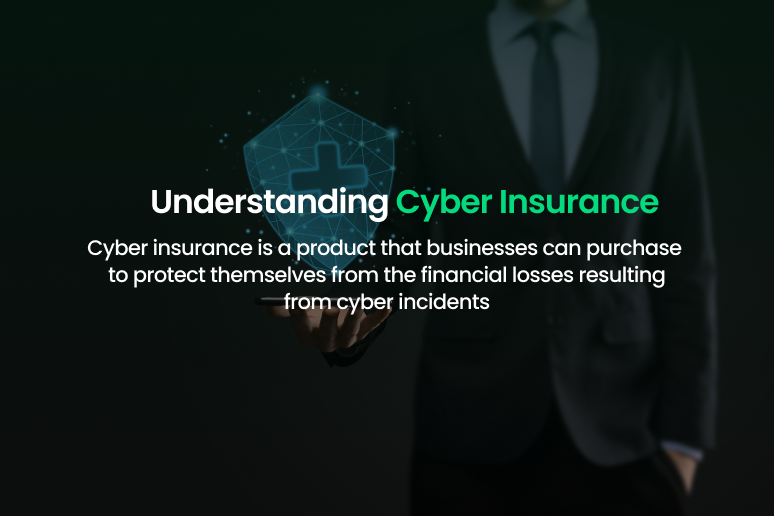
What is Cyber Insurance?
Cyber insurance is a product that businesses can purchase to protect themselves from the financial losses resulting from cyber incidents such as data breaches, business interruption, and network damage.
The Rise of Cyber Insurance: A Response to Growing Threats
As cyber threats have proliferated, so has the market for cyber insurance. It has become an essential tool for businesses, offering a financial safety net that complements their cybersecurity defences.
The proliferation of cyber threats is not just a perception but a well-documented reality. According to a report by Cybersecurity Ventures, cybercrime is projected to inflict damages totalling $6 trillion globally in 2021, a figure that is expected to grow to $10.5 trillion annually by 2025.

This escalation is driven by the diversification and sophistication of cyber attacks, including phishing, ransomware, data breaches, and more. Businesses, regardless of size, find themselves in the crosshairs of cybercriminals, making robust defence mechanisms non-negotiable.
Real-World Examples of Cyber Insurance Claims
To illustrate the tangible benefits of cyber insurance, let’s examine some real-world scenarios where cyber insurance played a pivotal role in mitigating financial losses from cyber incidents:
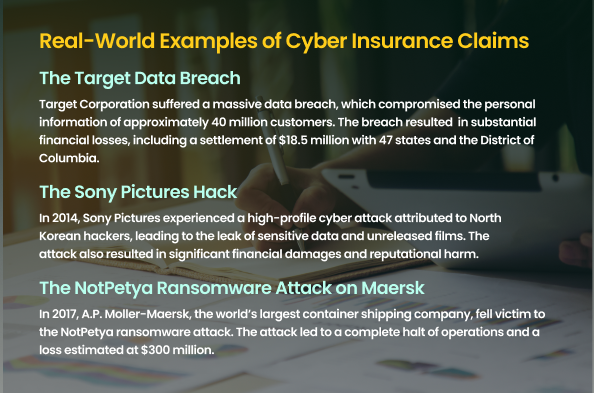
- The Target Data Breach: In 2013, Target Corporation suffered a massive data breach, which compromised the personal information of approximately 40 million customers. The breach resulted in substantial financial losses, including a settlement of $18.5 million with 47 states and the District of Columbia. Target’s cyber insurance policy played a crucial role in covering a significant portion of these costs, demonstrating the financial safety net that such insurance provides.
- The Sony Pictures Hack: In 2014, Sony Pictures experienced a high-profile cyber attack attributed to North Korean hackers, leading to the leak of sensitive data and unreleased films. The attack also resulted in significant financial damages and reputational harm. Sony’s cyber insurance coverage was instrumental in absorbing some of the financial impacts of the attack, highlighting the importance of cyber insurance in managing cyber risk.
- The NotPetya Ransomware Attack on Maersk: In 2017, A.P. Moller-Maersk, the world’s largest container shipping company, fell victim to the NotPetya ransomware attack. The attack led to a complete halt of operations and a loss estimated at $300 million. Maersk’s cyber insurance policy was critical in covering a portion of the financial losses incurred, showcasing the role of cyber insurance in recovery from disruptive cyber incidents.
Cyber Insurance vs. Cybersecurity: A Detailed Comparison
Differences in Approach
While cybersecurity focuses on prevention and protection, cyber insurance is designed to mitigate the financial impact of incidents that breach these defences.
Benefits of Each Solution
Cybersecurity measures are indispensable for preventing attacks, whereas cyber insurance provides a financial backup plan, ensuring business continuity post-incident.
Synergies between Cyber Insurance and Cybersecurity
The most effective risk management strategies involve a combination of both cybersecurity and cyber insurance, leveraging the strengths of each to provide comprehensive protection.
The Role of Cyber Insurance in a Comprehensive Cybersecurity Strategy
Integrating cyber insurance into a broader cybersecurity strategy enhances an organisation’s ability to respond to and recover from cyber incidents.
The Financial Implications of Cyber Attacks
The Cost of Cybersecurity Breaches
Cyber attacks can be devastatingly expensive, not just in direct financial terms but also through reputational damage and loss of customer trust.
How Cyber Insurance Mitigates Financial Risks
Cyber insurance plays a critical role in absorbing the financial shocks that come with cyber incidents, helping businesses to remain viable in their aftermath.
Future Trends in Cyber Protection
Emerging Cybersecurity Technologies
Innovations in cybersecurity, such as AI and machine learning, are on the horizon, promising enhanced capabilities in detecting and neutralising threats.
The Evolving Landscape of Cyber Insurance
The cyber insurance industry is also evolving, with policies becoming more tailored and comprehensive in response to the changing nature of cyber risks.
Conclusion: Balancing Protection and Preparedness with Mitigata

As businesses navigate through the complexities of the digital era, the distinction and synergy between cybersecurity and cyber insurance have never been more critical. These two components are fundamental in crafting a resilient and comprehensive defence strategy against the myriad of cyber threats that loom over the digital landscape. Cybersecurity, with its focus on preventing cyber threats through technological and procedural safeguards, lays the groundwork for robust digital defence. On the other hand, cyber insurance provides a safety net, ensuring businesses can bounce back from the financial repercussions of cyber incidents.
Enter Mitigata, a pioneer in harmonising smart cyber insurance with cutting-edge cybersecurity solutions. This innovative approach not only mitigates the risk of cyber threats but also equips businesses with a robust financial recovery plan. Mitigata’s integrated solutions offer a sense of security and preparedness, knowing that all bases are covered—from preventing cyber attacks to managing their aftermath financially.
Understanding the Cost of Cyber Insurance for Startups
In today’s digital age, startups are at the forefront of innovation, leveraging technology to disrupt industries and drive growth. However, with great opportunity comes great risk, especially in the realm of cybersecurity. As cyber threats continue to evolve and proliferate, startups must navigate the complex landscape of cyber risk management to protect their assets and reputation.
The Growing Threat Landscape for Startups
Cyberattacks against small businesses have been on the rise in recent years, with 46% of all breaches impacting businesses with fewer than 1,000 employees. Despite the common belief that hackers target larger enterprises, smaller companies are increasingly attractive prey for cybercriminals. Social engineering attacks, like phishing, are particularly common among small businesses, who are often perceived as easier targets due to their weaker security measures.
Consider this: 61% of SMBs were targeted by cyberattacks in 2021, with malware accounting for 18% of the attacks. Shockingly, 82% of ransomware attacks targeted companies with fewer than 1,000 employees, and 37% of those hit had fewer than 100 employees.
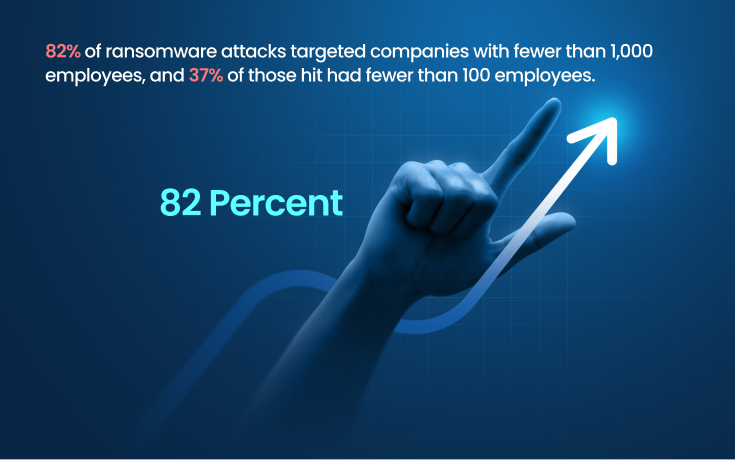
These statistics paint a grim picture of the cyber threat landscape for startups, highlighting the urgent need for robust cybersecurity measures.
The Cost of Cyberattacks for Startups
The consequences of a cyberattack can be devastating for startups, both financially and reputationally. Statistics show that around 60% of small and medium businesses that suffer a cyberattack close down within six months of the incident.
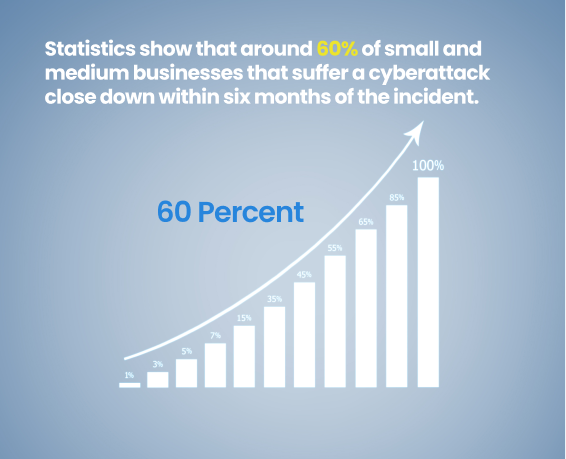
Furthermore, cyberattacks are becoming increasingly frequent, with one occurring every 11 seconds by 2021.
Imagine the scenario: Your startup, fueled by innovation and ambition, falls victim to a ransomware attack. Your critical data is encrypted, and your operations grind to a halt. As you scramble to contain the damage, you’re faced with daunting expenses: legal fees, regulatory fines, customer notifications, and credit monitoring costs. The financial strain is compounded by the damage to your reputation, eroding trust among your clients and partners.
The Role of Cyber Insurance for Startups
Amidst the rising tide of cyber threats, cyber insurance emerges as a lifeline for startups, providing financial protection against the unforeseen costs of cyber incidents. Cyber insurance, also known as cybersecurity insurance or data breach insurance, covers a range of expenses, including:
- Data breach response: Notification costs, credit monitoring, and legal expenses
- Business interruption: Compensation for lost revenue due to cyber incidents
- Ransomware: Coverage for ransom payments and related expenses
- Third-party liability: Protection against lawsuits from affected parties
- Cyber extortion: Coverage for costs related to threats of cyber extortion
- Privacy liability: Addressing claims related to privacy violations
Factors Influencing Cyber Insurance Costs for Startups
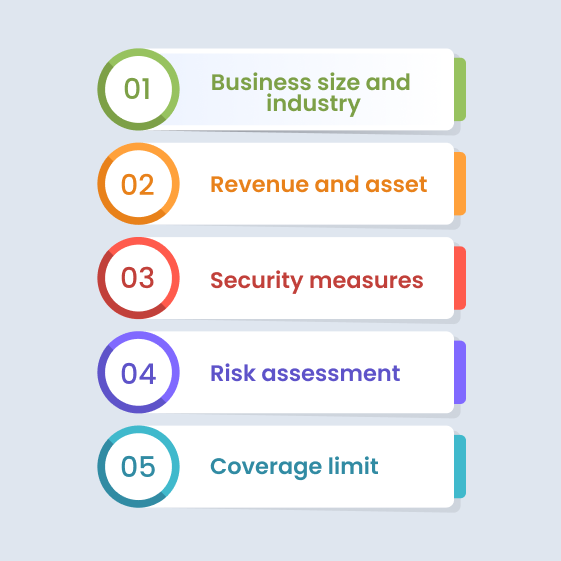
The cost of cyber insurance for startups depends on several factors, including:
- Business size and industry: Startups in high-risk industries may face higher premiums.
- Revenue and assets: Larger companies typically pay more due to their higher exposure.
- Security measures: Strong cybersecurity practices can lead to lower premiums.
- Risk assessment: Startups undergo risk assessments to evaluate their vulnerabilities.
- Coverage limits: Higher limits result in higher premiums.
Last words!

In conclusion, cyber insurance is a vital investment for startups seeking to protect their future in the digital age. By understanding the cost, coverage, and benefits of cyber insurance, startups can safeguard their assets and reputation against the ever-present threat of cybercrime.
Mitigata is here to guide startups through the complexities of cyber insurance and provide tailored solutions to meet their unique needs.
Contact us today to secure your business against cyber risks and ensure long-term success in the digital landscape.
Importance of Cyber Insurance in Data Breach Prevention
Introduction:
In today’s hyperconnected world, data breaches have become a pervasive threat, lurking around every digital corner and targeting businesses of all sizes. The recent data breach at Nissan Oceania, impacting 100,000 individuals, serves as a stark reminder of the devastating consequences of cyberattacks. As we delve into the pivotal role of cyber insurance in mitigating such risks, let’s examine the urgent need for robust cybersecurity measures in light of this alarming breach.
The Growing Threat of Data Breaches:
Recent statistics paint a grim picture of the cybersecurity landscape, underscoring the urgency for businesses to fortify their defences against data breaches:
- Rising Incidence: Data breaches have become alarmingly common, with 61% of SMBs falling victim to cyberattacks in 2021 alone.
- Targeting Small Businesses: Contrary to popular belief, small businesses are not immune to cyber threats. In fact, 46% of all cyber breaches impact businesses with fewer than 1,000 employees.
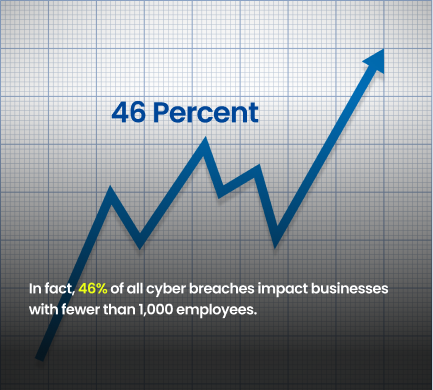
- Increased Sophistication: Cybercriminals are continuously evolving their tactics, leveraging advanced techniques like social engineering and malware to infiltrate business networks and steal sensitive data.
- Financial Fallout: The financial consequences of a data breach can be devastating, with studies showing that around 60% of small and medium businesses that suffer a cyberattack close down within six months of the incident.
The Role of Cyber Insurance:
Amidst the looming spectre of data breaches, cyber insurance emerges as a critical safeguard for businesses, offering financial protection and peace of mind in the face of cyber threats.
Here’s why cyber insurance is indispensable in the realm of data breach prevention:
- Financial Resilience: Cyber insurance serves as a safety net, providing businesses with the financial resources to navigate the aftermath of a data breach. From covering legal expenses and regulatory fines to reimbursing affected parties for damages and credit monitoring, cyber insurance helps mitigate the financial impact of a breach.
- Comprehensive Coverage: A robust cyber insurance policy offers comprehensive coverage tailored to the unique needs and risks of each business. Coverage may include data breach response, business interruption, ransomware protection, third-party liability, and cyber extortion, among other aspects.
- Risk Transfer: By transferring the financial risk of a data breach to the insurer, businesses can effectively manage their exposure to cyber threats. This allows companies to focus on their core operations without being crippled by the financial fallout of a cyberattack.
- Reputation Management: In the aftermath of a data breach, preserving brand reputation is paramount. Cyber insurance not only helps cover the costs of public relations and reputation management but also provides guidance and support to mitigate reputational damage and rebuild trust with stakeholders.
- Regulatory Compliance: With the regulatory landscape evolving rapidly, compliance with data protection laws and regulations is non-negotiable. Cyber insurance helps ensure compliance by covering costs related to regulatory fines and penalties resulting from a data breach.
Conclusion:

In conclusion, the prevalence and severity of data breaches underscore the critical importance of cyber insurance in today’s digital age. As cyber threats continue to evolve and businesses face increasing pressure to protect sensitive information, investing in cyber insurance is not just prudent—it’s essential for long-term viability and resilience.
At Mitigata, we understand the complex challenges businesses face in navigating the cybersecurity landscape. Our tailored cyber insurance solutions offer comprehensive coverage and peace of mind, allowing businesses to focus on growth and innovation without fear of crippling financial losses from data breaches.
Don’t wait until it’s too late—protect your business with cyber insurance and fortify your defences against the ever-present threat of data breaches. Contact us today to learn more about how Mitigata can help safeguard your business’s future in an increasingly digital world.









